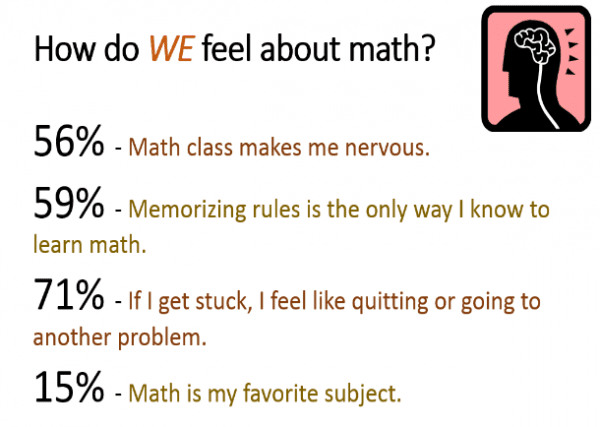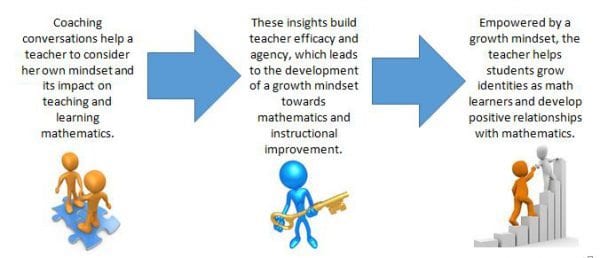“Math has always been difficult for me to understand. Word problems are the worst. Every time I see a word problem it scares me. I already know I won’t be able to solve it.”
These are not the words of a student in elementary school or even high school. They were written by Kimberly, a preservice teacher on the first day of class in my Elementary Mathematics Methods course. Kimberly will have her own class of students very soon. How will her beliefs about her own capacity to make sense of mathematics impact her students’ opportunities for math learning?

Survey Results from Preservice Teachers in Elementary Math Methods Course
The Impact of Mindset on Teaching and Learning
When teachers hold fixed mindsets about their abilities to understand and teach mathematics, student learning suffers. The act of teaching requires continuous, often unconscious decision making. In-the-moment decisions about how to support and respond to students are automatically framed around a teacher’s internal cognitive maps, which include her mathematical mindset.
Perhaps a few minutes are shaved off of today’s math time because the reading lesson ran long. This decision may be based, in part, on the teacher’s confidence teaching language arts but not mathematics. If this same unconscious decision is made on a regular basis, student learning is impacted. A teacher’s tendency to blame students’ failure on factors outside her control (poverty, English proficiency, behavior, lack of parental support, a student’s innate inability to understand mathematics) points to a lack of teacher efficacy and a fixed mindset. Teachers with such mental frames are likely to put less-than-full effort into teaching because they don’t genuinely belief that their efforts make a difference. Such teachers may avoid partnering with a coach and collaborating with colleagues to hide their perceived lack of ability. Resistance to change is often a mask for feelings of inadequacy and an indicator of a fixed mindset.
In contrast, a teacher who holds a growth mindset operates from a problem solving perspective, believing she is capable to working through the challenges which are a natural part of teaching. She helps her students view their own learning challenges through the lens of “I’m still learning” and “I haven’t succeeded yet but I know I can.” Growth-minded teachers love learning and know they are capable of continuing to refine their teaching craft. In her book Faster Isn’t Smarter: Messages about Math, Teaching and Learning in the 21st Century, Past NCTM President Cathy Seeley says “Just as we tell teachers that any student can learn high-level mathematics under the right circumstances, likewise we can expect any committed mathematics teacher to learn new strategies to help all students reach their full potential” (p. 213). This disposition is essential in our efforts to improve mathematics instruction.
How can Coaching Help?
A teacher’s awareness of her own mindset and consciousness about how this mindset influences her decisions and learning is a metacognitive process that can be grown. Coaching supports meta-cognition and is, therefore, an effective vehicle for helping teachers study the impact of their personal mindsets on student mindsets and student learning.
How does coaching for a growth mindset work?

So, how might coaching help Kimberly build her mathematical mindset? Here are some questions a coach might use to help a teacher examine the impact of her current beliefs and alter her mindset.
- You’re not yet confident with mathematics because of some past experiences you’ve had. How do you think these feelings may have affected your own math learning?
- How might your current mathematical mindset be impacting your instruction and your students’ learning?
- As you think forward to the end of this school year, what would you like to hear your students say about the subject of mathematics and about their capacity to learn and understand math?
- What are some ways you might begin growing a new mathematics learning identity? How will you know if you are making progress towards this goal?
- As you work to rebuild your relationship with mathematics, who might you rely on for support?
- What do you want to remain mindful of when you find yourself feeling anxious about mathematics?
- Why is this goal important to you?
What are some ways that you are helping your teachers to reflect on their mathematical mindsets and examine the interplay of mindsets within their own classrooms?
Please share your thoughts and your stories in the comments.
Be sure to check out Part 1 of Sue’s “Coaching for a Mathematical Mindset” blog series here.

Sue Chapman is a professional educator, presenter, and author who has devoted over 30 years to instructional improvement and mathematics education. Throughout her career, Sue has served and taught in several different areas of professional education, including instructional and leadership positions. Sue’s passion for professional learning and her ability to inspire teachers to come together around a shared vision of success have been instrumental in helping schools and districts develop systems and internal capacity to achieve continuous improvement of mathematics instruction.

 All Blog Posts
All Blog Posts
Comments